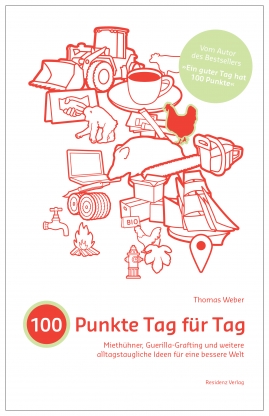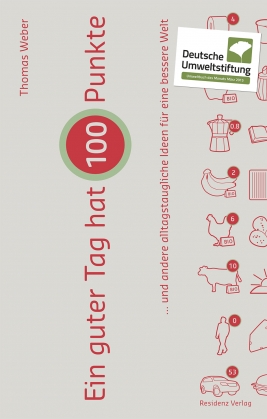Skurrile Aufforderungen, die sich als durchaus praxistaugliche Ideen für einen ökologischen Lebensstil entpuppen.
[Quelle: „Freude“, SONNENTOR]
Weber ist kein Faserschmeichler. Er zeigt Probleme auf und liefert Lösungen mit (..) Langweilig wird es den Lesern nicht beim Surfen zwischen den 23 teils radikal kreativen Vorschlägen.
[Quelle: GRÜNE WELT JOURNAL]
…ein sehr feiner Gedankenanstoß (…) Ich empfehle die Lektüre, sie macht klüger, sie macht bewusster und das eine oder andere können sie sicher leicht umsetzen.
[Quelle: Anna Jeller, SUPERFLY]
Ein Buchtipp für die ganze Familie…
[Quelle: JÖ - JUNG ÖSTERREICH]
Das Buch ist amüsant zu lesen, obwohl es einen sehr ernsten Hintergrund behandelt, bietet tolle Anregungen und lässt darüber staunen, welch tolle Konzepte es gibt.
[Quelle: Sabrina Haupt, ICH MACH ES ANDERS]
…wohltuend undogmatisch…
[Quelle: Klaus Kamolz, PROFIL]
"100 Punkte Tag für Tag" ist erfrischende und inspirierende Lektüre, die häppchenweise oder in einem Zug genossen werden kann und laut Kampagne 0 Punkte kostet.
[Quelle: Nina Sahdeva; FAIRUNTERWEGS.ORG]
Thomas Weber greift in “100 Punkte Tag für Tag“ die großen Themen auf – und interpretiert sie verblüffend und provokant. So schafft er es, dass der Leser nicht ins Muster “Oft gehört, nichts geändert” verfällt, sondern das Thema und sein Verhalten neu betrachtet. Nicht nur die Ideen sind neu, die Hintergründe sind gut recherchiert und erstaunlich aktuell.
[Quelle: Philipp Stierand, SPEISERAEUME.DE]
An vielerlei interessanten, nicht durchgängig neuen Beispielen zeigt er (Weber) unterhaltsam und informationsreich, wie jeder seinen Alltag umweltschonend und nachhaltig gestalten kann.
[Quelle: Helga Lüdtke, EKZ]
Es lohnt sich, einige im Buch vorgestellten Ideen für sich auszuprobieren. Und wenn auch nur aus Neugier oder Spaß am Anderssein.
[Quelle: kpk, INCENTIVE CONGRESS JOURNAL]
Müsste man die Bücher von Thomas Weber mit drei Adjektiven beschreiben so wäre es: abwechslungsreich, überraschend und undogmatisch. Das macht das Lesen seiner Bücher zum kurzweiligen Vergnügen. Gewohnt pointiert formuliert bringt Weber seine Tipps für ein bewussteres Leben auf den Punkt.
[Quelle: Carina Rumpold, KOMMUNALNET]
Thomas Weber ist Weltverbesserer – im besten Sinne des Wortes. Einer, der seinen ausgestreckten Zeigefinger so lässig, wie’s geht, im Hosensack lässt, und der weiß, wovon er spricht.
[Quelle: Verena Randolf, NÖN]
Es gibt Ratgeberbücher, die schon beim Lesen unzufrieden machen. Und es gibt welche, die zum Lachen bringen, zum Nachdenken anregen und tatsächlich einen Unterschied machen.
[Quelle: VD, NEWS]
Große Empfehlung!
[Quelle: POPULÄRKULTUR]
Über Nachhaltigkeit zu schreiben, ist die eine Sache. Das so zu tun, wie Thomas Weber ist die andere. Leicht verdaulich, kreativ, ziemlich witzig und mitunter kurios, kommen seine Ideen daher. Sie sind inspirierend, alltagstauglich, sparsam und bereichernd.
[Quelle: SONNENTOR]
Thomas Weber, Journalist, Buchautor und Herausgeber einer Zeitschrift und einer Buchreihe, hat mit seinen zwei sehr erfolgreichen Büchern „Ein guter Tag hat 100 Punkte“ und „100 Punkte Tag für Tag“ praktikable und interessante Vorschläge für ein nachhaltiges Leben vorgestellt.
[Quelle: HTL UP TO DATE]
Thomas Weber gibt alltagstaugliche, teils ungewöhnliche Tipps, wie man umweltfreundlicher und trotzdem gut leben kann.
[Quelle: MITTELBAYRISCHE ZEITUNG]









